By Richard Luthmann
In a ruling steeped in questionable judgment and accusations of misogyny, Connecticut Superior Court Judge Thomas J. O'Neill presides over a case with high stakes for Karen Riordan and her three children. Riordan has accused her ex-husband, Christopher Ambrose, of abusive behavior and coercive control—claims supported by evidence and multiple testimonies, including those from forensic psychiatrist Dr. Bandy X. Lee, M.D.
Yet, Judge O'Neill dismissed these allegations, focusing instead on Riordan's “anger” and “irrationality.” His decision has raised questions: is the judge merely a pawn in Ambrose's manipulations, or is he displaying a disturbing bias?
O'Neill’s ruling relied heavily on Riordan’s emotional responses, which he used to justify denying her custody rights. His order repeatedly criticized Riordan’s “anger” and claimed it “clouds her ability to make rational and reasonable decisions.”
O'Neill provided no psychological evaluation or expert testimony to support his conclusions about her mental state. Instead, he labeled her reaction to her situation as evidence of unfitness. This judgment, experts argue, is both scientifically baseless and reflective of a deep-seated bias against female emotions.
This approach starkly contrasts with the documented behaviors of Ambrose, whom forensic experts have described as highly manipulative and potentially dangerous.
Ambrose, a former TV writer and attorney, scored a 32 on the Hare Psychopathy Checklist, placing him in the category of individuals who pose the highest risk. Despite this, O'Neill overlooked these red flags, dismissing testimony from Dr. Lee and others who sought to highlight the psychological impact of Ambrose's alleged coercive control.
The shocking part is that Judge O’Neill granted a restraining order against Riordan in August 2023. For an entire year, she was unable to see three teenage children.
Twisting Jennifer’s Law to Shield an Alleged Abuser
Jennifer’s Law, named in honor of Jennifer Dulos—a mother who disappeared in 2019 after expressing fears of her estranged husband—is intended to protect victims of coercive control and abuse. Jennifer had voiced deep concern over her safety, but her case, mired in legal battles and abuse allegations, ended in tragedy, sparking legal reforms meant to prevent such outcomes.
The law broadened Connecticut’s definition of domestic violence to include coercive tactics like manipulation, isolation, and gaslighting.
In this case, Judge Thomas O’Neill inverted the purpose of Jennifer’s Law, using it to protect an abuser while undermining the victim’s credibility. Rather than scrutinizing Christopher Ambrose’s history of coercive behavior, documented by forensic experts and Dr. Bandy Lee, Judge O’Neill turned the law against Karen Riordan, painting her anger and emotional response as evidence of her own instability.
O’Neill framed Riordan’s resistance to Ambrose’s actions as a failure to maintain "rational and reasonable" behavior, ignoring the trauma and fears that her allegations of abuse would reasonably produce. Critics argue this case demonstrates the very misuse advocates warned about when Jennifer’s Law was proposed.
Attorney Alexander Cuda, who represented Ambrose in August 2023, strategically invoked the law to secure a one-year restraining order against Riordan on behalf of their three teenage children, despite the children’s prior testimonies that they felt unsafe around their father because of previous abuse.
Ambrose's tactics, supported by Attorney Allan Kassenoff, flipped the intent of Jennifer’s Law, silencing the children and isolating Riordan from her support system—the opposite of the law’s intended protection for victims of coercive control.
A handwritten note by Ambrose from the time he originally sought the Restraining Order (RO) references Kassenoff and their relationship.
The note also shows that Judge O’Neill was the desired choice to hear the application to cast the 110-pound schoolteacher as a dangerous perpetrator of domestic violence. Why?
“If I get O’Neill it’s not a problem; if I don’t, not sure,” reads the note.
Is there an improper relationship between Ambrose and O’Neill? Are the Ambrose children already “bought and paid for”?
The judge's ruling omitted troubling allegations, including that Ambrose is a dangerous abuser who had manipulated federal agents, orchestrated an FBI raid based on fabricated information, and sexually abused his children.
“Ambrose lied to federal agents, leading to a SWAT team raid,” recounted Dr. Lee.
Ambrose’s manipulation extended to lying about his children’s whereabouts, prompting a raid on Riordan’s friend’s home. Such deception is a red flag for coercive control, yet Judge O’Neill dismissed it, focusing instead on Riordan’s alleged "anger issues." Jennifer’s Law was meant to safeguard victims of abuse like Jennifer Dulos, whose cries for help were ignored.
However, Judge O’Neill’s approach has raised concerns that the law’s spirit has been distorted, allowing abusers with legal knowledge or influence to weaponize it against their victims—a scenario Jennifer’s family and advocates for domestic violence survivors had hoped to prevent.
Dismissing Expert Testimonies as “Emotionally Driven”
Judge O'Neill’s ruling questioned the credibility of multiple witnesses who supported Riordan, including those with professional expertise in family psychology and mental health. His decision reduced Dr. Bandy Lee’s testimony to “emotionally driven” statements, dismissing her clinical assessment of Ambrose’s psychopathy and manipulation tactics.
Dr. Lee’s forensic evaluation indicated that Ambrose’s behavior showed clear markers of DARVO (Deny, Attack, Reverse Victim, and Offender)—a manipulation strategy often employed by abusers to make themselves appear as victims.
“When a judge fixates on the emotions of one party, especially when that party is a victim, it reflects a lack of psychological insight and an alarming judicial bias,” Dr. Lee stated in previous assessments.
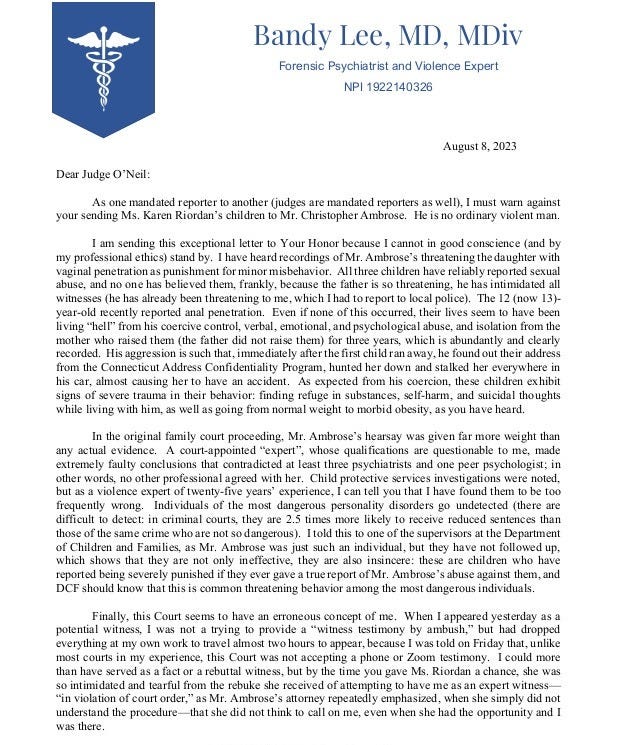
Dr. Lee’s expertise was insufficient for O'Neill, who chose instead to vilify her conclusions as biased and unreliable while accepting Ambrose’s own account and allegations at face value.
Ambrose’s Legal Tactics Ignored by the Court
The case further exposes an unsettling double standard: while O'Neill berated Riordan for non-compliance and “anger,” he ignored Ambrose’s ability to navigate the legal system to his advantage. With his background in law and fiction, Ambrose has used his legal knowledge to secure rulings that limit Riordan’s influence over her children’s lives.
O’Neill’s decision failed to consider this power imbalance, instead framing Riordan’s lack of compliance with court orders as defiance rather than desperation.
Ambrose’s experience as an attorney granted him a tactical advantage that Riordan did not possess. Despite this disparity, O’Neill’s ruling faulted Riordan for her supposed inability to “move past her anger,” framing her resistance as irrational while ignoring Ambrose’s alleged history of coercion and abuse.
Attacking Riordan’s Support System
Judge O'Neill’s treatment of Riordan’s supporters added another troubling dimension to his ruling. He labeled her friends and confidants as “aggressive supporters” and discounted their testimonies as biased, calling them “enablers.”
This description is notable given that these individuals were Riordan’s lifeline amidst her ongoing battles with Ambrose. Their support was not based solely on emotional bonds; they were witnesses to Ambrose's alleged manipulation, but O'Neill dismissed them as unreliable allies.
The judge’s view on Riordan’s network mirrors patterns in abusive relationships, where abusers isolate victims from supportive figures. By undermining Riordan’s connections, O’Neill reinforced the isolation often imposed by coercive controllers, critics argue.
Dr. Lee has remarked that “judicial alienation of a victim’s support system is a red flag—it mirrors the tactics abusers use to exert control.”
Playing Psychologist Without Credentials
O’Neill’s decision did not simply ignore mental health expertise—it attempted to replace it. Throughout the ruling, O'Neill made statements implying he understood Riordan’s psychological state better than forensic experts, repeatedly declaring her emotions as problematic without a formal evaluation or therapeutic intervention.
His comments about her “irrational behavior” and the need for “therapeutic treatment” venture into territory reserved for mental health professionals, sparking criticism that he has overstepped his authority.
“Judges who presume expertise in psychology without training risk not only injustice but serious harm to the families they serve,” Dr. Lee observed.
O’Neill’s willingness to cast judgment on Riordan’s mental health without a formal basis raises questions about his own psychological understanding and fitness to handle family court cases involving trauma and abuse.
O’Neill’s Misogynistic Approach to Judging Emotions
The language used in O'Neill's ruling reads like a primer on misogynistic judicial stereotypes. By labeling Riordan’s anger as evidence of instability, O'Neill fell into the familiar trap of discrediting women by portraying them as irrational. This approach has fueled criticism that O'Neill’s ruling reflects more about his personal biases than about Riordan's parenting ability.
“Judges often suffer from an ‘omnipotent personality disorder,’ where they believe they can engage in medical and clinical assessments for which they are neither trained nor qualified,” said Jill Jones Soderman, Executive Director of the Foundation for the Child Victims of the Family Court. “They see themselves as omnipotently capable of passing critical assessments in areas outside their expertise, training, or knowledge.”
“Judge O’Neill chose to make it a disqualifier for a mother to express justified anger in a litigation process, disregarding tenets of psychiatric diagnosis related to trauma. Any other response would be a severely pathological defense mechanism," she added.
"The misogynistic disrespect embodied in the judge's cruel and condescending remarks reflects a pathological disregard seen all too often in male judges toward the protective instincts of mothers. Ms. Riordan should be recognized for her remarkable restraint and her courage to sustain a legal battle to protect her children.”
“Given the record of abuse, had Ms. Riordan taken lethal action against Christopher Ambrose, it might have been seen as a case of involuntary manslaughter, much like the Jackie Rubio murder case in Oregon," Soderman concluded. "Her ability to respond within legal channels, despite the trauma, speaks volumes about her strength.”
Judge O'Neill’s evident disregard for the impact of trauma and his unwillingness to recognize Ambrose’s DARVO tactics have sparked calls for a formal investigation into his handling of the case.
Observers have questioned whether O’Neill’s approach to the case is indicative of deeper issues within the Connecticut family court system, where misogynistic attitudes and victim-blaming can leave families in the hands of alleged abusers.
Conclusion: A Broken System Failing Its Most Vulnerable
The Ambrose v. Riordan case demonstrates a justice system that appears to favor legal maneuvering over genuine protection. Jennifer’s Law, meant to shield victims from coercive control, has been twisted by O'Neill into a weapon against the very people it was designed to protect. His dismissal of expert testimony, reliance on personal biases, and apparent disregard for the power dynamics at play suggest a troubling lack of judicial competence.
As public outcry grows, advocates are left asking whether Judge O'Neill should face investigation, punishment, or even removal. One thing is clear: until courts address their own biases and take seriously the realities of coercive control, vulnerable families will remain at risk.










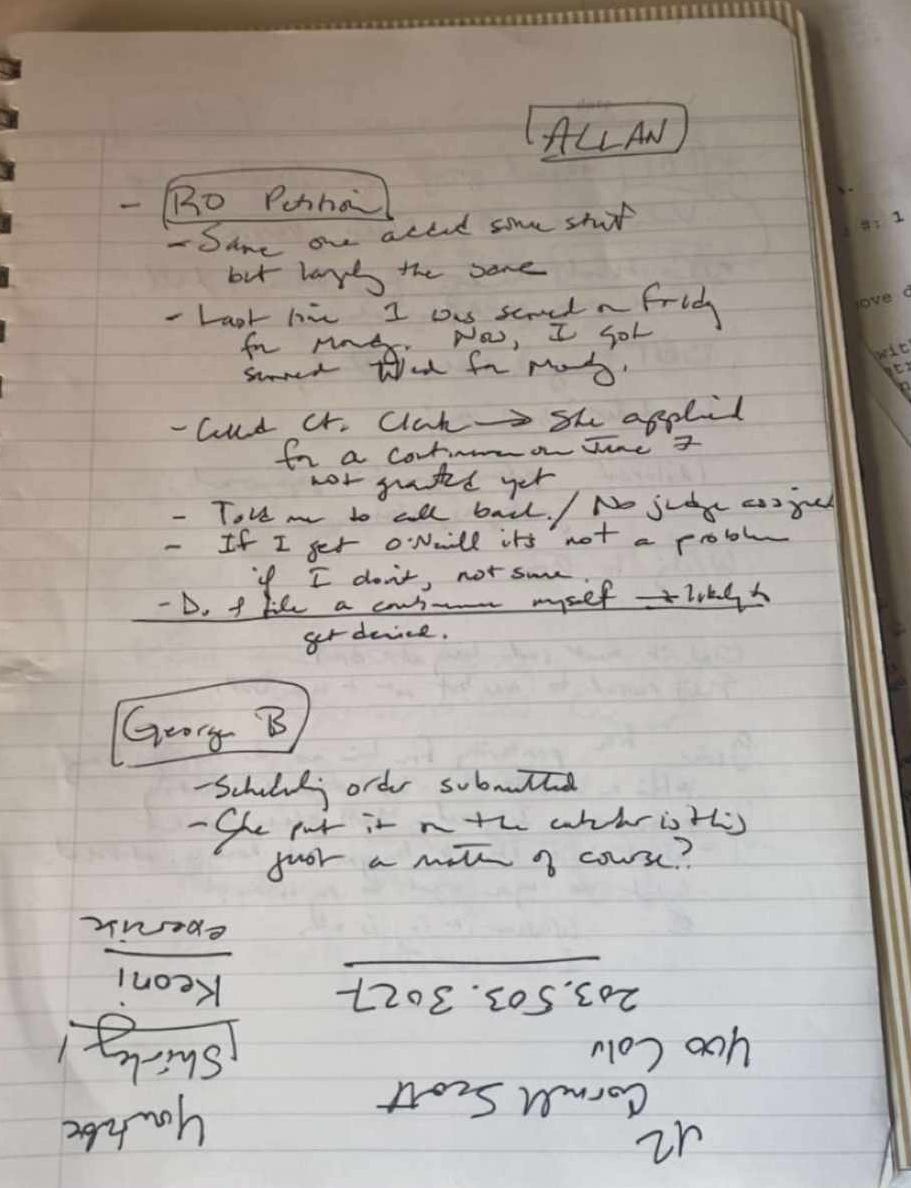



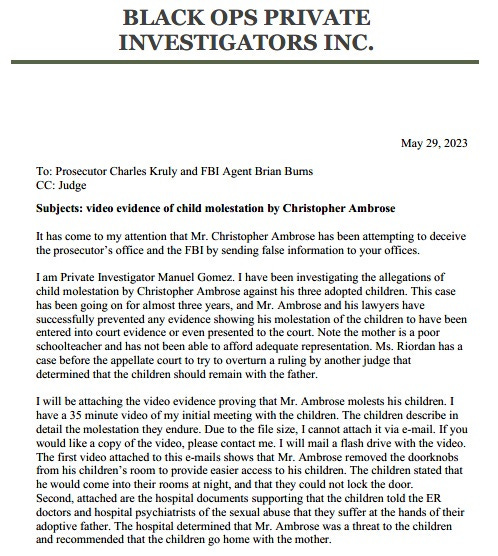
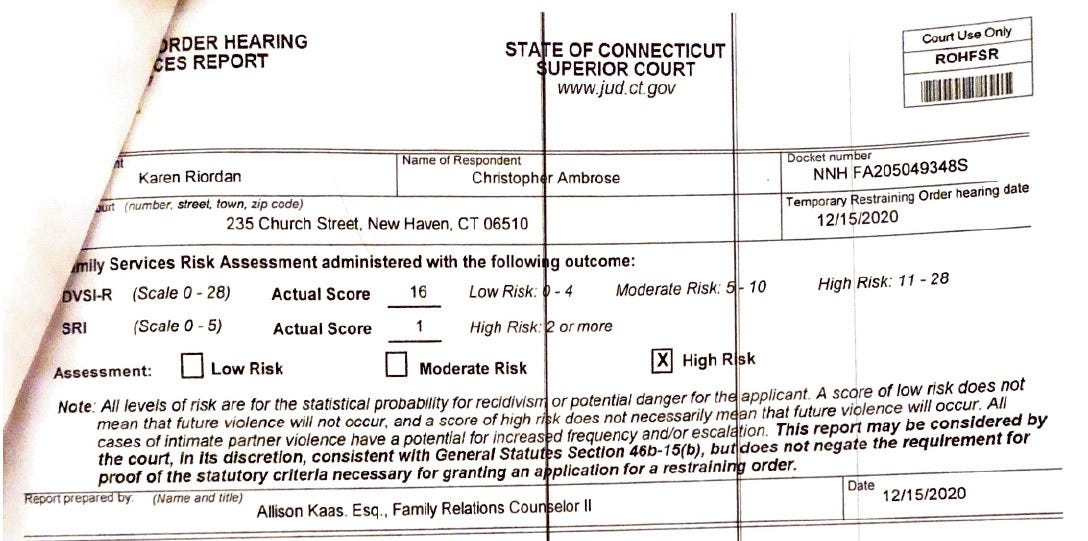


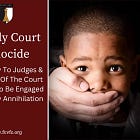
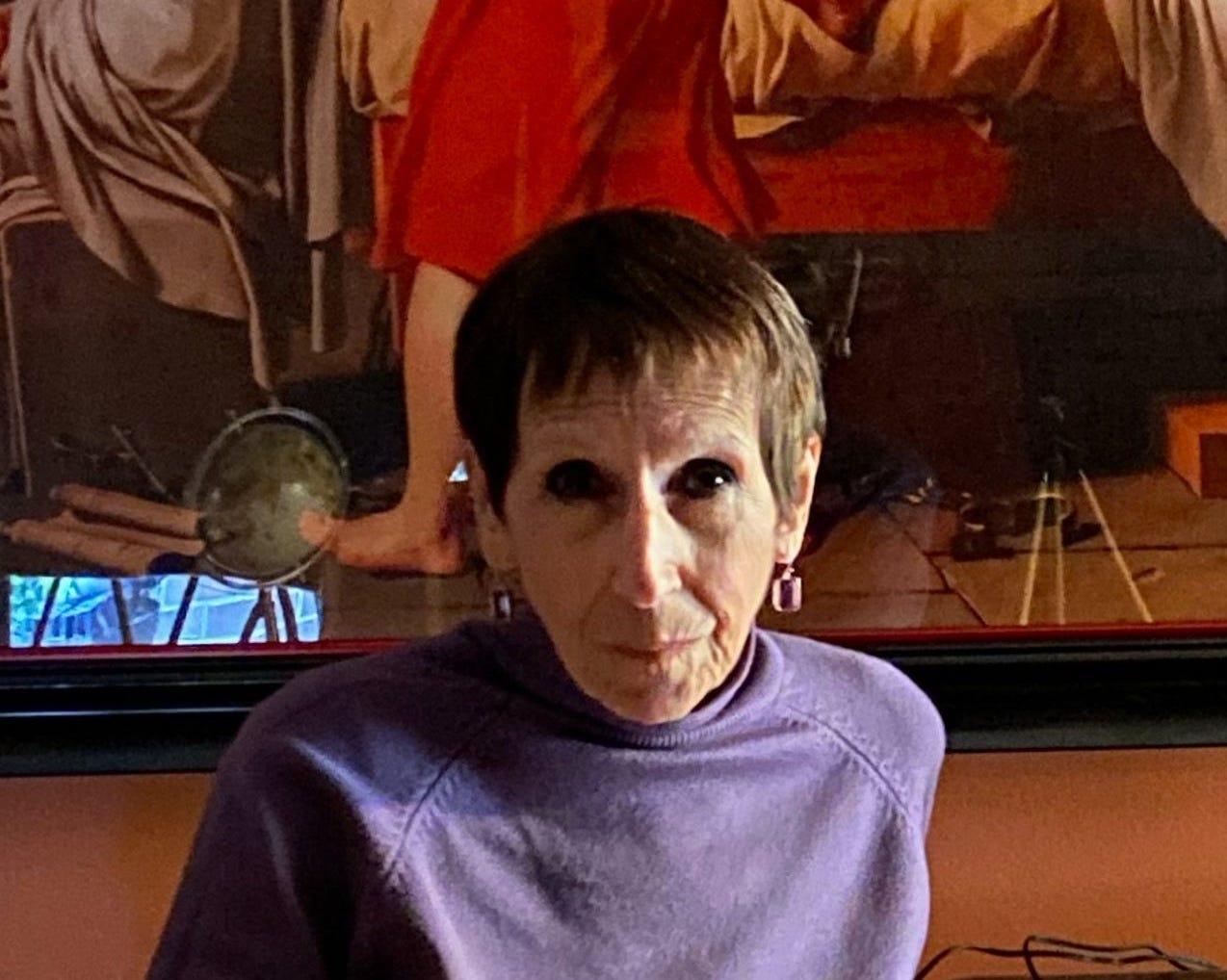









Share this post